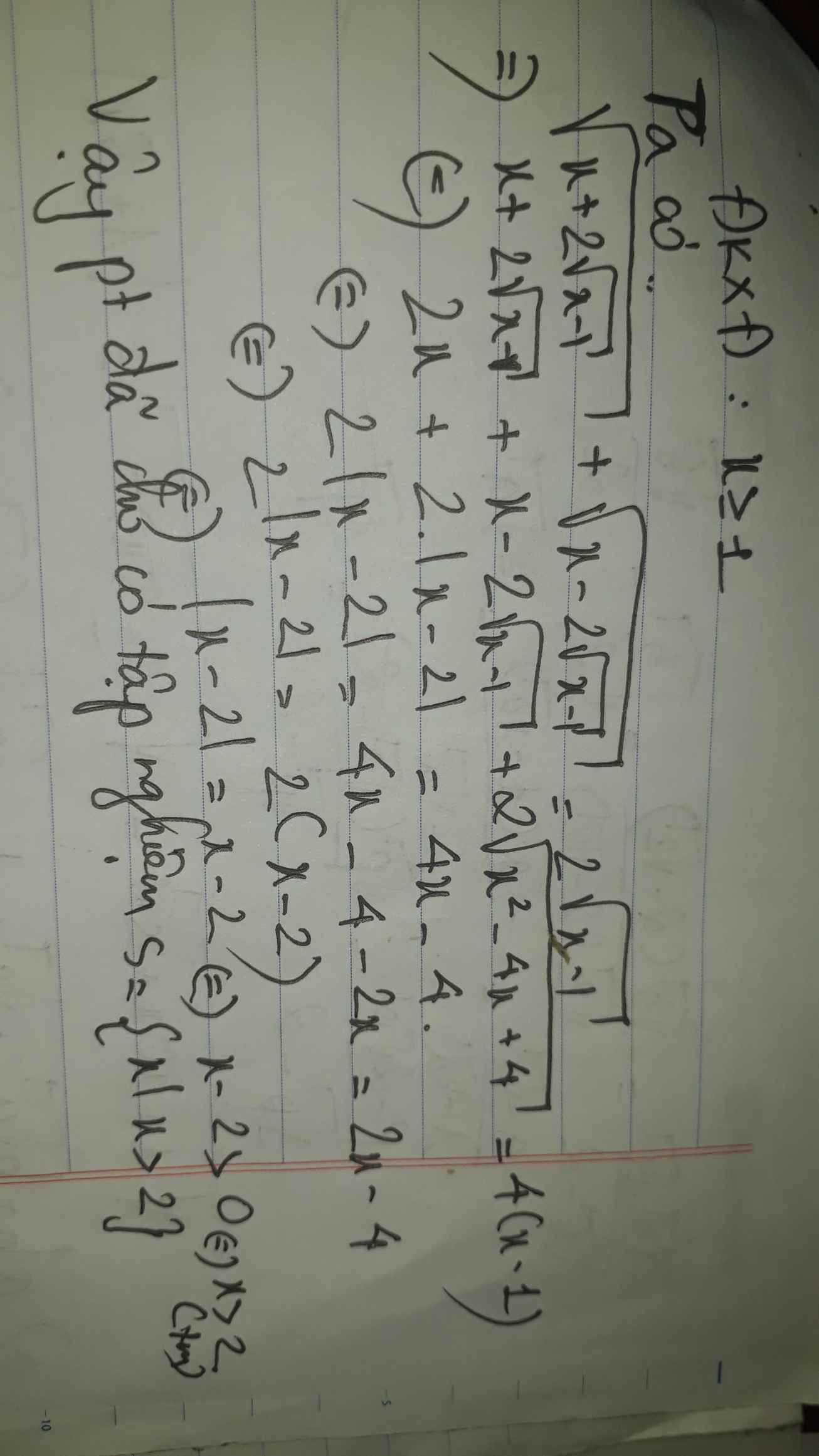Giải Phương Trình
\(\sqrt{x-2\sqrt{x-1}}-\sqrt{x+2\sqrt{x-1}}=2\)
Hãy nhập câu hỏi của bạn vào đây, nếu là tài khoản VIP, bạn sẽ được ưu tiên trả lời.


ĐKXĐ: \(x\ge-1\)
\(\sqrt{x+1+2\sqrt{x+1}+1}+\sqrt{x+1-6\sqrt{x+1}+9}=2\sqrt{x+1-2\sqrt{x+1}+1}\)
\(\Leftrightarrow\sqrt{\left(\sqrt{x+1}+1\right)^2}+\sqrt{\left(\sqrt{x+1}-3\right)^2}=2\sqrt{\left(\sqrt{x+1}-1\right)^2}\)
\(\Leftrightarrow\left|\sqrt{x+1}+1\right|+\left|\sqrt{x+1}-3\right|=2\left|\sqrt{x+1}-1\right|\)
Ta có:
\(\left|\sqrt{x+1}+1\right|+\left|\sqrt{x+1}-3\right|\ge\left|\sqrt{x+1}+1+\sqrt{x+1}-3\right|=2\left|\sqrt{x+1}-1\right|\)
Dấu "=" xảy ra khi và chỉ khi:
\(\sqrt{x+1}-3\ge0\Rightarrow x\ge8\)
Vậy nghiệm của pt là \(x\ge8\)

\(\sqrt{x+2\sqrt{x}+1}-\sqrt{x-2\sqrt{x}+1}=2\left(x\ge0\right)\\ \Leftrightarrow\sqrt{\left(\sqrt{x}+1\right)^2}-\sqrt{\left(\sqrt{x}-1\right)^2}=2\\ \Leftrightarrow\sqrt{x}+1-\left|\sqrt{x}-1\right|=2\\ \Leftrightarrow\left[{}\begin{matrix}\sqrt{x}+1-\left(\sqrt{x}-1\right)=2,\forall\sqrt{x}-1\ge0\\\sqrt{x}+1-\left(1-\sqrt{x}\right)=2,\forall\sqrt{x}-1< 0\end{matrix}\right.\\ \Leftrightarrow\left[{}\begin{matrix}0\sqrt{x}=0,\forall x\ge1\\\sqrt{x}=1,\forall x< 1\end{matrix}\right.\\ \Leftrightarrow\left[{}\begin{matrix}x\in R,x\ge1\\x=1,x< 1\left(loại\right)\end{matrix}\right.\\ \Leftrightarrow x\in R,x\ge1\)

ĐKXĐ: \(x\ge1\)
Do \(\sqrt{x-\sqrt{x^2-1}}.\sqrt{x+\sqrt{x^2-1}}=\sqrt{x^2-x^2+1}=1\)
Đặt \(\sqrt{x-\sqrt{x^2-1}}=t\Rightarrow\sqrt{x+\sqrt{x^2-1}}=\dfrac{1}{t}\)
Phương trình trở thành:
\(t+\dfrac{1}{t}=2\Rightarrow t^2-2t+1=0\Rightarrow t=1\)
\(\Rightarrow\sqrt{x-\sqrt{x^2-1}}=1\Leftrightarrow x-\sqrt{x^2-1}=1\)
\(\Leftrightarrow x-1=\sqrt{x^2-1}\)
\(\Rightarrow x^2-2x+1=x^2-1\)
\(\Rightarrow x=1\) (thỏa mãn)

`\sqrt{x+2\sqrt{x-1}}+\sqrt{x-2\sqrt{x-1}}=2\sqrt{x-1}(x>=1)`
`<=>\sqrt{x-1+2\sqrt{x-1}+1}+\sqrt{x-1-2\sqrt{x-1}+1}=2\sqrt{x-1}`
`<=>\sqrt{(\sqrt{x-1}+1)^2}+\sqrt{(\sqrt{x-1}-1)^2}=2\sqrt{x-1}`
`<=>|\sqrt{x-1}+1|+|\sqrt{x-1}-1|=2\sqrt{x-1}`
`<=>\sqrt{x-1}+1+|\sqrt{x-1}-1|=2\sqrt{x-1}`
`<=>|\sqrt{x-1}-1|=\sqrt{x-1}-1`
`<=>\sqrt{x-1}-1>=0``
`<=>sqrt{x-1}>=1`
`<=>x-1>=1`
`<=>x>=2`
Vậy `S={x|x>=2}`

ĐKXĐ: x>=1
\(\sqrt{x+2\sqrt{x-1}}+\sqrt{x-2\sqrt{x-1}}=\dfrac{1}{2}\left(x+3\right)\)
\(\Leftrightarrow\sqrt{x-1+2\sqrt{x-1}+1}+\sqrt{x-1-2\sqrt{x-1}+1}=\dfrac{1}{2}\left(x+3\right)\)
=>\(\sqrt{\left(\sqrt{x-1}+1\right)^2}+\sqrt{\left(\sqrt{x-1}-1\right)^2}=\dfrac{1}{2}\left(x+3\right)\)
=>\(\sqrt{x-1}+1+\left|\sqrt{x-1}-1\right|=\dfrac{1}{2}\left(x+3\right)\)
TH1: \(x>=2\)
PT sẽ tương đương với \(\sqrt{x-1}+1+\sqrt{x-1}-1=\dfrac{1}{2}\left(x+3\right)\)
=>\(2\sqrt{x-1}=\dfrac{1}{2}\left(x+3\right)\)
=>\(4\sqrt{x-1}=x+3\)
=>\(\sqrt{16x-16}=x+3\)
=>x>=-3 và (x+3)^2=16x-16
=>x>=-3 và x^2+6x+9-16x+16=0
=>x>=-3 và x^2-7x+25=0
=>Loại
TH2: 1<=x<2
PT sẽ là \(\sqrt{x-1}+1+1-\sqrt{x-1}=\dfrac{1}{2}\left(x+3\right)\)
=>1/2(x+3)=2
=>x+3=4
=>x=1(nhận)

ĐKXĐ: \(x\ge1\)
Ta có:
\(\sqrt{x+2\sqrt{x-1}}+\sqrt{x-2\sqrt{x-1}}=\dfrac{x+3}{2}\\ \Leftrightarrow\sqrt{\left(\sqrt{x-1}+1\right)^2}+\sqrt{\left(\sqrt{x-1}-1\right)^2}=\dfrac{x+3}{2}\\ \Leftrightarrow\sqrt{x-1}+1+\left|\sqrt{x-1}-1\right|=\dfrac{x+3}{2}\\ \Leftrightarrow\sqrt{x-1}+\left|\sqrt{x-1}-1\right|=\dfrac{x+1}{2}\left(1\right)\)
Ta xét 2 trường hợp sau:
TH1: \(x\ge2\)
Khi đó:
\(\left(1\right)\Leftrightarrow2\sqrt{x-1}-1=\dfrac{x+1}{2}\\ \Leftrightarrow2\sqrt{x-1}=\dfrac{x+3}{2}\\ \Leftrightarrow16\left(x-1\right)=x^2+6x+9\\ \Leftrightarrow x^2-10x+25=0\\ \Leftrightarrow\left(x-5\right)^2=0\\ \Leftrightarrow x=5\left(TMĐK\right)\)
TH2: \(1\le x< 2\)
Khi đó:
\(\left(1\right)\Leftrightarrow1=\dfrac{x+1}{2}\Leftrightarrow x=1\left(TMĐK\right)\)
Vậy x=1 hoặc x=5

\(1,\sqrt{x+2+4\sqrt{x-2}}=5\left(x\ge2\right)\\ \Leftrightarrow\sqrt{\left(\sqrt{x-2}+4\right)^2}=5\\ \Leftrightarrow\sqrt{x-2}+4=5\\ \Leftrightarrow\sqrt{x-2}=1\\ \Leftrightarrow x-2=1\Leftrightarrow x=3\\ 2,\sqrt{x+3+4\sqrt{x-1}}=2\left(x\ge1\right)\\ \Leftrightarrow\sqrt{\left(\sqrt{x-1}+4\right)^2}=2\\ \Leftrightarrow\sqrt{x-1}+4=2\\ \Leftrightarrow\sqrt{x-1}=-2\\ \Leftrightarrow x\in\varnothing\left(\sqrt{x-1}\ge0\right)\)
\(3,\sqrt{x+\sqrt{2x-1}}=\sqrt{2}\left(x\ge\dfrac{1}{2};x\ne1\right)\\ \Leftrightarrow x+\sqrt{2x-1}=2\\ \Leftrightarrow x-2=-\sqrt{2x-1}\\ \Leftrightarrow x^2-4x+4=2x-1\\ \Leftrightarrow x^2-6x+5=0\\ \Leftrightarrow\left(x-5\right)\left(x-1\right)=0\\ \Leftrightarrow\left[{}\begin{matrix}x=5\left(tm\right)\\x=1\left(loại\right)\end{matrix}\right.\)
\(4,\sqrt{x-2+\sqrt{2x-5}}=3\sqrt{2}\left(x\ge\dfrac{5}{2}\right)\\ \Leftrightarrow\sqrt{2x-4+2\sqrt{2x-5}}=6\\ \Leftrightarrow\sqrt{\left(\sqrt{2x-5}+1\right)^2}=6\\ \Leftrightarrow\sqrt{2x-5}+1=6\\ \Leftrightarrow\sqrt{2x-5}=5\\ \Leftrightarrow2x-5=25\Leftrightarrow x=15\left(TM\right)\)

ĐKXĐ \(x\ge1\)
\(P=\dfrac{\left(\sqrt{x}+1\right)^2}{x-1}+\dfrac{\left(\sqrt{x}-1\right)^2}{x-1}-\dfrac{2\sqrt{x}+2}{x-1}\)
\(P=\dfrac{x+2\sqrt{x}+1+x-2\sqrt{x}+1-2\sqrt{x}-2}{x-1}\)
\(P=\dfrac{2x-2\sqrt{x}}{x-1}\)
\(P=\dfrac{2\sqrt{x}\left(\sqrt{x}-1\right)}{\left(\sqrt{x}+1\right)\left(\sqrt{x}-1\right)}\)
\(P=\dfrac{2\sqrt{x}}{\sqrt{x}+1}\)
Giải phương trình ???

\(P=\dfrac{2+x+\sqrt{x}}{\sqrt{x}\left(\sqrt{x}-1\right)}\cdot\dfrac{\sqrt{x}\left(2-\sqrt{x}\right)}{\sqrt{x}-1}\\ P=\dfrac{\left(2-\sqrt{x}\right)\left(x+\sqrt{x}+2\right)}{\left(\sqrt{x}-1\right)^2}\)

1) \(\sqrt{x^2+1}=\sqrt{5}\)
\(\Leftrightarrow x^2+1=5\)
\(\Leftrightarrow x^2=5-1\)
\(\Leftrightarrow x^2=4\)
\(\Leftrightarrow x^2=2^2\)
\(\Leftrightarrow\left[{}\begin{matrix}x=2\\x=-2\end{matrix}\right.\)
2) \(\sqrt{2x-1}=\sqrt{3}\) (ĐK: \(x\ge\dfrac{1}{2}\))
\(\Leftrightarrow2x-1=3\)
\(\Leftrightarrow2x=3+1\)
\(\Leftrightarrow2x=4\)
\(\Leftrightarrow x=\dfrac{4}{2}\)
\(\Leftrightarrow x=2\left(tm\right)\)
3) \(\sqrt{43-x}=x-1\) (ĐK: \(x\le43\))
\(\Leftrightarrow43-x=\left(x-1\right)^2\)
\(\Leftrightarrow x^2-2x+1=43-x\)
\(\Leftrightarrow x^2-x-42=0\)
\(\Leftrightarrow\left(x-7\right)\left(x+6\right)=0\)
\(\Leftrightarrow\left[{}\begin{matrix}x=7\left(tm\right)\\x=-6\left(tm\right)\end{matrix}\right.\)
4) \(x-\sqrt{4x-3}=2\) (ĐK: \(x\ge\dfrac{3}{4}\))
\(\Leftrightarrow\sqrt{4x-3}=x-2\)
\(\Leftrightarrow4x-3=\left(x-2\right)^2\)
\(\Leftrightarrow x^2-4x+4=4x-3\)
\(\Leftrightarrow x^2-8x+7=0\)
\(\Leftrightarrow\left(x-7\right)\left(x-1\right)=0\)
\(\Leftrightarrow\left[{}\begin{matrix}x=7\left(tm\right)\\x=1\left(tm\right)\end{matrix}\right.\)
5) \(\dfrac{\sqrt{x}+1}{\sqrt{x}+3}=\dfrac{1}{2}\) (ĐK: \(x\ge0\))
\(\Leftrightarrow\sqrt{x}+3=2\sqrt{x}+2\)
\(\Leftrightarrow2\sqrt{x}-\sqrt{x}=3-2\)
\(\Leftrightarrow\sqrt{x}=1\)
\(\Leftrightarrow x=1^2\)
\(\Leftrightarrow x=1\left(tm\right)\)
1)
\(\sqrt{x^2+1}=\sqrt{5}\\ \Leftrightarrow x^2+1=5\\ \Leftrightarrow x^2=5-1=4\\ \Leftrightarrow\left[{}\begin{matrix}x=2\\x=-2\end{matrix}\right.\)
Vậy PT có nghiệm `x=2` hoặc `x=-2`
2)
ĐKXĐ: \(x\ge\dfrac{1}{2}\)
\(\sqrt{2x-1}=\sqrt{3}\\ \Leftrightarrow2x-1=3\\ \Leftrightarrow2x=4\\ \Leftrightarrow x=2\left(tm\right)\)
Vậy PT có nghiệm `x=2`
3)
\(ĐKXĐ:x\le43\)
PT trở thành:
\(43-x=\left(x-1\right)^2=x^2-2x+1\\ \Leftrightarrow43-x-x^2+2x-1=0\\ \Leftrightarrow-x^2+x+42=0\\ \Leftrightarrow\left[{}\begin{matrix}x=-6\left(tm\right)\\x=7\left(tm\right)\end{matrix}\right.\)
Vậy PT có nghiệm `x=-6` hoặc `x=7`
4)
ĐKXĐ: \(x\ge\dfrac{3}{4}\)
PT trở thành:
\(\sqrt{4x-3}=x-2\\ \Leftrightarrow4x-3=\left(x-2\right)^2=x^2-4x+4\\ \Leftrightarrow4x-3-x^2+4x-4=0\\ \Leftrightarrow-x^2+8x-7=0\\ \Leftrightarrow\left[{}\begin{matrix}x=1\left(tm\right)\\x=7\left(tm\right)\end{matrix}\right.\)
Vậy PT có nghiệm \(x=1\) hoặc \(x=7\)
5)
ĐKXĐ: \(x\ge0\)
PT trở thành:
\(\sqrt{x+3}=2\sqrt{x}+2\\ \Leftrightarrow x+3=\left(2\sqrt{x}+2\right)^2=4x+8\sqrt{x}+4\\ \Leftrightarrow x+3-4x-8\sqrt{x}-4=0\\ \Leftrightarrow-3x-8\sqrt{x}-1=0\left(1\right)\)
Đặt \(\sqrt{x}=t\left(t\ge0\right)\)
Khi đó:
(1)\(\Leftrightarrow3t^2+8t+1=0\)
\(\Leftrightarrow\left[{}\begin{matrix}t=\dfrac{-4+\sqrt{13}}{3}\left(loại\right)\\t=\dfrac{-4-\sqrt{13}}{3}\left(loại\right)\end{matrix}\right.\)
Vậy PT vô nghiệm.

Ta có điều kiện của x>=1
Câu này giải tiếp bài của bạn Thu Hương
cái dấu ngoặc đơn là giá đối
\(\left(\sqrt{x-1}-1\right)-\sqrt{x-1}+1=2\)
Ta chia thành hai trường hợp
TH1: giả sử \(\sqrt{x-1}-1<0\)
\(-\left(\sqrt{x-1}-1\right)-\sqrt{x-1}=3\)
\(-\sqrt{x-1}-\sqrt{x-1}=2\)
\(-2\sqrt{x-1}=2\)
\(\sqrt{x-1}=-1\)
\(x-1=\left(-1\right)^2\)
x=2 (thỏa điều kiện)
TH2: Giả sử \(\sqrt{x-1}-1>=0\)
\(\sqrt{x-1}-1-\sqrt{x-1}+1=2\)
\(0=2\) VÔ LÝ
Vì X>=1 nên x có nghiệm bằng 2